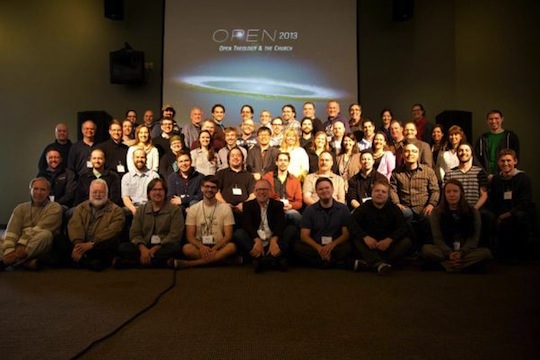We run our website the way we wished the whole internet worked: we provide high quality original content with no ads. We are funded solely by your direct support. Please consider supporting this project.
Reflecting on Open2013
 T. C. Moore has posted some of his reflections from the Open Theism conference. T. C. was one of several people who pulled this conference together and he did a great job. He’s also incredibly smart and very active in the open view community. Also, he’s a young church planter in Boston and I’m sure he’s grieving with the rest of that city (and the world) after the bombings yesterday. Our hearts are broken with him. Lord Jesus bring your peace and reveal your heart in the aftermath of this tragedy.
T. C. Moore has posted some of his reflections from the Open Theism conference. T. C. was one of several people who pulled this conference together and he did a great job. He’s also incredibly smart and very active in the open view community. Also, he’s a young church planter in Boston and I’m sure he’s grieving with the rest of that city (and the world) after the bombings yesterday. Our hearts are broken with him. Lord Jesus bring your peace and reveal your heart in the aftermath of this tragedy.
From T. C.’s blog:
The conference was held at Woodland Hills Church and senior pastor Greg Boyd was one of the conference’s keynote speakers.John Sanders and Thomas Jay Oord also delivered keynote talks. All three keynote speakers did a fantastic job, and each one provided substantive Q&A sessions following their talks. Dr. Oord even integrated Q&A into his presentation making it extraordinarily interactive. But one undeniable highlight of the conference was Jessica Kelley‘s sharing of Henry’s Story. Her testimony of how the Open View and the Warfare Worldview has helped her process her pain and preserved her faith in God was definitely the emotional pinnacle of the conference. Several of us on the planning team noted her poise during Q&A and her powerful gift of clear communication.
Category: General
Tags: Boston Bombings, Open Theism, T.C. Moore
Related Reading

Theo Graff Podcast: Featuring Jessica Kelley
We have a special treat for you today. T. C. Moore is a great friend of ReKnew and he’s recently started a “Jesus-centered, hip hop flavored, geeky, theological, kingdom exploration” called the THEO GRAFF PODCAST. He’s published four podcasts so far and you’ll want to listen to them all when you get a chance, but we wanted…

How do you respond to Acts 4:27–28?
“[B]oth Herod and Pontius Pilate, with the Gentiles and the peoples of Israel, gathered together against your holy servant Jesus, whom you anointed, to do whatever your hand and your plan had predestined to take place.” This passage is very close in content to Acts 2:23 (see How do you respond to Acts 2:23?). While…

Isn’t the World Unsafe If God Doesn’t Control Everything?
If God isn’t in control of everything, the world feels unsafe. If the future is open and if things can happen outside of God’s will, what guarantee is there that there is a point to a person’s suffering? Maybe it’s all just bad luck. My experience has been that many of those who honestly examine…

What Unfulfilled Prophesies Say About the Open View
Image by Lori Greig via Flickr Yesterday, we posted about how Messianic prophesies are understood in the open view of the future. Today, this post will look at prophesies that are not fulfilled in the way predicted and what that can tell us about the open view of the future. In John Goldingay’s excellent multi-volume work, Old…

What is the significance of Acts 27:10-44?
This is the passage deal with Paul’s ill-fated voyage to Italy as a prisoner. The ship ran into very bad weather and Paul announced, “Men, I can see that our voyage is going to be disastrous and bring great loss to ship and cargo, and to our own lives also” (vs. 10). As he reminded…

What is the significance of 2 Peter 3:9–12?
Peter says that the Lord has delayed his coming because “he is patient with you, not wanting any to perish” (vs. 9). We are encouraged to be “looking for and hastening the coming of the day of God” [NIV: “speed its coming”] (vs. 12). If the future is an eternally fixed reality, of course God…
